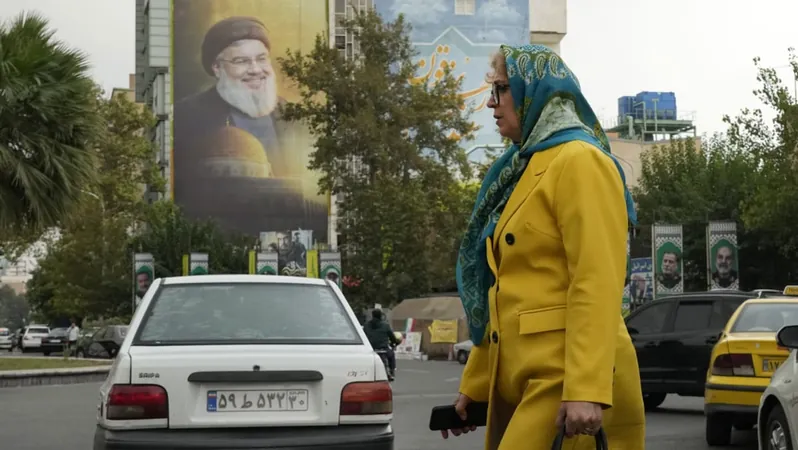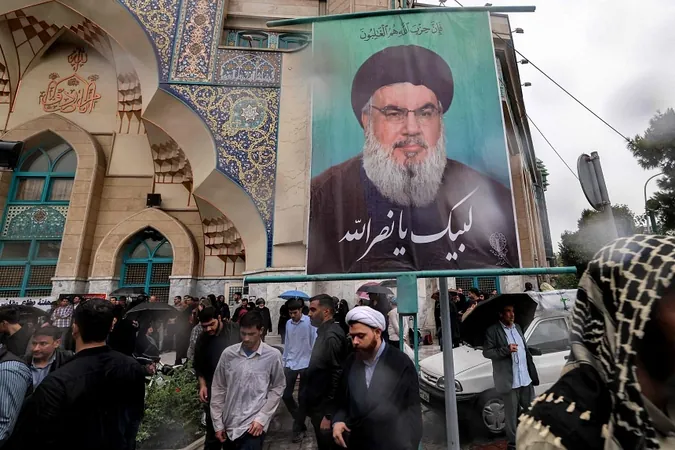
Iran Faces Critical Challenge Following the Assassination of Hezbollah Leader Hassan Nasrallah
2024-09-29
Iran Faces Critical Challenge Following the Assassination of Hezbollah Leader Hassan Nasrallah
TEHRAN – The assassination of Hezbollah's chief, Hassan Nasrallah, by Israeli forces poses an existential crisis for Iran as it grapples with the loss of its pivotal ally amid escalating regional tensions.
On September 28, 2023, Hezbollah confirmed the death of Nasrallah following an Israeli airstrike in Beirut's southern suburbs, marking a dangerous escalation in the longstanding conflict that has intensified since the onset of the Gaza conflict last year. Israel described the operation as a necessary step to weaken its adversaries, leading to fears of a broader war engulfing the region.
In immediate response, Iran's Supreme Leader Ayatollah Ali Khamenei declared that Nasrallah's death 'will not be in vain,' while First Vice President Mohammad Reza Aref articulated a vow of retaliation against Israel, proclaiming that this act would lead to the Jewish state's 'destruction.'
Hezbollah has long been regarded as the cornerstone of Iran's influence in the Middle East, effectively acting as a proxy force against Israel. Analysts such as Karim Sadjadpour from the Carnegie Endowment have noted that Nasrallah's leadership has been significant in advancing Iran’s regional ambitions, further complicating the geopolitical landscape with his demise.
Nevertheless, experts warn that this incident leaves Iran in a precarious position. Ali Vaez from the International Crisis Group highlighted that Hezbollah's deterrent capabilities against Israel were 'in complete disarray,' potentially endangering Iran's interests in the region. Tehran must now navigate this serious dilemma while avoiding direct confrontation, especially given the fragile state of its economy impacted by severe international sanctions that have sparked rampant inflation and unemployment.
Additionally, the assassination comes just two months after the killing of Hamas's political leader Ismail Haniyeh in Tehran. These deadly strikes underline a momentum from Tel Aviv aimed at countering Iran's influence, with Tehran vowing retaliation for both assassinations.
Complicating the situation for Iran further is its dire economic predicament. Rebuilding Hezbollah's strength and capabilities will demand resources that Iran might struggle to afford without exacerbating its own economic hardships. Engaging in military support for such efforts could deepen Tehran's financial woes against a backdrop of already significant sanctions – a situation that produces a tough calculus for Iranian leadership.
As the Iranian government strives to reassess its strategies, it has moved cautiously since the Gaza conflict escalated, seeking appropriate responses that avoid provoking the United States. Iran's previous cautions included maintaining a degree of deniability during attacks on Israeli interests, underscoring a careful balancing act between asserting influence and avoiding direct military confrontation.
While there are concerns about Hezbollah’s weakened internal communications and operational capabilities following the assassination, experts like Mossadegh Mossadeghpour contend that Hezbollah has historically shown resilience and could potentially regroup, though the extent of its current capabilities remains to be seen.
The implications of Nasrallah's assassination extend beyond mere loss; they challenge the very fabric of the Iran-aligned resistance front in the region. Failure to restore Hezbollah's strength risks not only Iran's interests in Lebanon but could cascade into broader instability throughout its network of allied militias in Syria, Iraq, and Yemen.
As government officials and analysts in Tehran assess this precarious moment, one question looms large: can Iran maintain its grip over its regional allies, or will the loss of Nasrallah mark the beginning of a significant decline in its influence? Only time will tell how Iran navigates this profound crisis and manages its war-weary coalition.



 Brasil (PT)
Brasil (PT)
 Canada (EN)
Canada (EN)
 Chile (ES)
Chile (ES)
 España (ES)
España (ES)
 France (FR)
France (FR)
 Hong Kong (EN)
Hong Kong (EN)
 Italia (IT)
Italia (IT)
 日本 (JA)
日本 (JA)
 Magyarország (HU)
Magyarország (HU)
 Norge (NO)
Norge (NO)
 Polska (PL)
Polska (PL)
 Schweiz (DE)
Schweiz (DE)
 Singapore (EN)
Singapore (EN)
 Sverige (SV)
Sverige (SV)
 Suomi (FI)
Suomi (FI)
 Türkiye (TR)
Türkiye (TR)